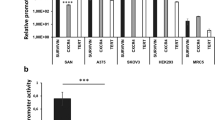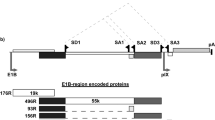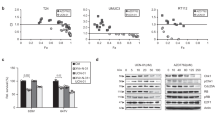Abstract
Replication-incompetent adenoviruses (Ad) carrying the herpes simplex thymidine kinase (HSVtk) gene have been used in a number of human cancer gene therapy trials, however transduction has generally been limited to a small minority of tumor cells. To solve this problem, replication-competent adenoviral vectors carrying transgenes such as HSVtk have been developed. However, contradictory evidence exists regarding the efficacy of these new vectors. Accordingly, we constructed and tested a replication-competent E3-deleted adenoviral vector containing the HSVtk suicide gene driven by the endogenous E3 promoter (Ad.wt.tk). This virus showed high level production of the HSVtk transgene and was more efficacious than a non-replicating virus in vitro, after injection into flank tumors, and against established intraperitoneal tumors. However, addition of ganciclovir (GCV) therapy to cells or tumor-bearing animals treated with the replicating vector containing the HSVtk suicide gene did not result in increased cell killing. Our results indicate that addition of HSVtk to a replicating Ad virus will not likely be useful in augmenting antitumor effects.
This is a preview of subscription content, access via your institution
Access options
Subscribe to this journal
Receive 12 print issues and online access
$259.00 per year
only $21.58 per issue
Buy this article
- Purchase on Springer Link
- Instant access to full article PDF
Prices may be subject to local taxes which are calculated during checkout






Similar content being viewed by others
References
Sterman D et al. Adenovirus-mediated herpes simplex virus thymidine kinase gene delivery in patients with localized malignancy: results of a phase 1 clinical trial in malignant mesothelioma Hum Gene Ther 1998 9: 1083–1092
Stewart A et al. Adenovector-mediated gene delivery of interleukin-2 in metastatic breast cancer and melanoma: results of a phase 1 clinical trial Gene Therapy 1999 6: 350–363
Swisher SG et al. Adenovirus-mediated p53 gene transfer in advanced non-small-cell lung cancer J Natl Cancer Inst 1999 91: 763–771
Clayman GL, Frank DK, Bruso PA, Goepfert H . Adenovirus-mediated wild-type p53 gene transfer as a surgical adjuvant in advanced head and neck cancers Clin Cancer Res 1999 5: 1715–1722
Herman JR et al. In situ gene therapy for adendocarcinoma of the prostate: a phase I clinical trial Hum Gene Ther 1999 10: 1239–1249
Russell SJ . Replicating vectors for gene therapy of cancer: risks, limitations and prospects Eur J Cancer 1994 30A: 1165–1171
Heise C, Kirn DH . Replication-selective adenoviruses as oncolytic agents J Clin Invest 2000 105: 847–851
Smith R . Studies on the use of viruses in the treatment of carcinoma of the cervix Cancer 1956 9: 1211–1218
Southam C . Present status of oncolytic virus studies Trans NY Acad Sci 1960 22: 657–673
Hermiston T . Gene delivery from replication-selective viruses: arming guided missiles in the war against cancer J Clin Invest 2000 105: 1169–1172
Alemany R, Balagué C, Curiel DT . Replicative adenoviruses for cancer therapy Nat Biotechnol 2000 18: 723–727
Kirn DH . Replication-selective microbiological agents: fighting cancer with targeted germ warfare J Clin Invest 2000 105: 837–839
Bischoff JR et al. An adenovirus mutant that replicates selectively in p53-deficient human tumor cells Science 1996 274: 373–376
Heise C et al. ONYX-015, an E1B gene-attentuated adenovirus, causes tumor-specific cytolysis and antitumoral efficacy that can be augmented by standard chemotherapeutic agents Nat Med 1997 3: 639–645
Rodriguez R et al. Prostate attenuated replication competent adenovirus (ARCA) CN706: a selective cytotoxic for prostate-specific antigen-positive prostate cancer cells Cancer Res 1997 57: 2559–2563
Yu D-C et al. The addition of adenovirus type 5 region E3 enables calydon virus 787 to eliminate distant prostate tumor xenografts Cancer Res 1999 59: 4200–4203
Hallenbeck PL et al. A novel tumor-specific replication-restricted adenoviral vector for gene therapy of hepatocellular carcinoma Hum Gene Ther 1999 10: 1721–1733
Han JS, Qian D, Wicha MS, Clarke MF . A method of limited replication for the efficient in vivo delivery of adenovirus to cancer cells Hum Gene Ther 1998 9: 1209–1216
Wildner O et al. Adenoviral vectors capable of replication improve the efficacy of HSVtk/GCV suicide gene therapy of cancer Gene Therapy 1998 6: 57–62
Wildner O, Blaese RM, Morris JC . Therapy of colon cancer with oncolytic adenovirus is enhanced by the addition of herpes simplex virus-thymidine kinase Cancer Res 1999 59: 410–413
Morris JC, Wildner O . Therapy of head and neck squamous cell carcinoma with an oncolytic adenovirus expressing HSV-tk Mol Ther 2000 1: 56–62
Wildner O, Morris JC . The role of the E1B 55 kDa gene product in onoclytic adenoviral vectors expressing herpes simplex virus-tk: assessment of antitumor efficacy and toxicity Cancer Res 2000 60: 4167–4174
Freytag SO et al. A novel three-pronged approach to kill cancer cells selectively: concomitant viral, double suicide gene, and radiotherapy Hum Gene Ther 1998 9: 1323–1333
Rogulski KR et al. Double suicide gene therapy augments the antitumor activity of a replication-competent lytic adenovirus through enhanced cytotoxicity and radiosensitization Hum Gene Ther 2000 11: 67–76
Curiel D . The development of conditionally replicative adenoviruses for cancer therapy Clin Cancer Res 2000 6: 3395–3399
Lanuti M et al. Evaluation of an E1/E4-deleted adenovirus expressing the herpes simplex thymidine kinase suicide gene in cancer gene therapy Hum Gene Ther 1999 10: 463–475
Hwang H et al. Gene therapy using adenovirus carrying the herpes simplex thymidine kinase gene to treat in vitro models of human malignant mesothelioma and lung cancer Am J Resp Cell Mol Biol 1995 13: 7–16
Heise C et al. Efficacy of replication-selective adenovirus against ovarian carcinomatosis is dependent on tumor burden, viral replication and p53 status Gene Therapy 2000 7: 1925–1929
Agha-Mohammadi S, Lotze MT . Immunomodulation of cancer: potential use of selectively replicating agents J Clin Invest 2000 105: 1173–1176
Smythe W et al. Successful adenovirus-mediated gene transfer in an in vivo model of human malignant mesothelioma Ann Thor Surg 1994 57: 1395–1401
Elshami AA et al. The effect of promoter strength in adenoviral vectors containing herpes simplex virus thymidine kinase on cancer gene therapy in vitro and in vivo Cancer Gene Ther 1997 4: 213–221
Acknowledgements
This research was supported by grants from the National Cancer Institute (NCI PO1 66726 and SPORE grant P50-CA-83638) and support provided by the Benjamin Shein Foundation for Humanity. RW is a postdoctoral fellow of the Mildred Scheel Stiftung für Krebsforschung der Deutschen Krebshilfe e.V. (D/98/02288).
Author information
Authors and Affiliations
Rights and permissions
About this article
Cite this article
Lambright, E., Amin, K., Wiewrodt, R. et al. Inclusion of the herpes simplex thymidine kinase gene in a replicating adenovirus does not augment antitumor efficacy. Gene Ther 8, 946–953 (2001). https://doi.org/10.1038/sj.gt.3301489
Received:
Accepted:
Published:
Issue Date:
DOI: https://doi.org/10.1038/sj.gt.3301489
Keywords
This article is cited by
-
An armed, YB-1-dependent oncolytic adenovirus as a candidate for a combinatorial anti-glioma approach of virotherapy, suicide gene therapy and chemotherapeutic treatment
Cancer Gene Therapy (2015)
-
Neoadjuvant in situ gene-mediated cytotoxic immunotherapy improves postoperative outcomes in novel syngeneic esophageal carcinoma models
Cancer Gene Therapy (2011)
-
Translational benefits of gene therapy to date
Clinical Oncology and Cancer Research (2011)
-
Analysis of adenovirus trans-complementation-mediated gene expression controlled by melanoma-specific TETP promoter in vitro
Virology Journal (2010)
-
Chemotherapy Delivered After Viral Immunogene Therapy Augments Antitumor Efficacy Via Multiple Immune-mediated Mechanisms
Molecular Therapy (2010)



